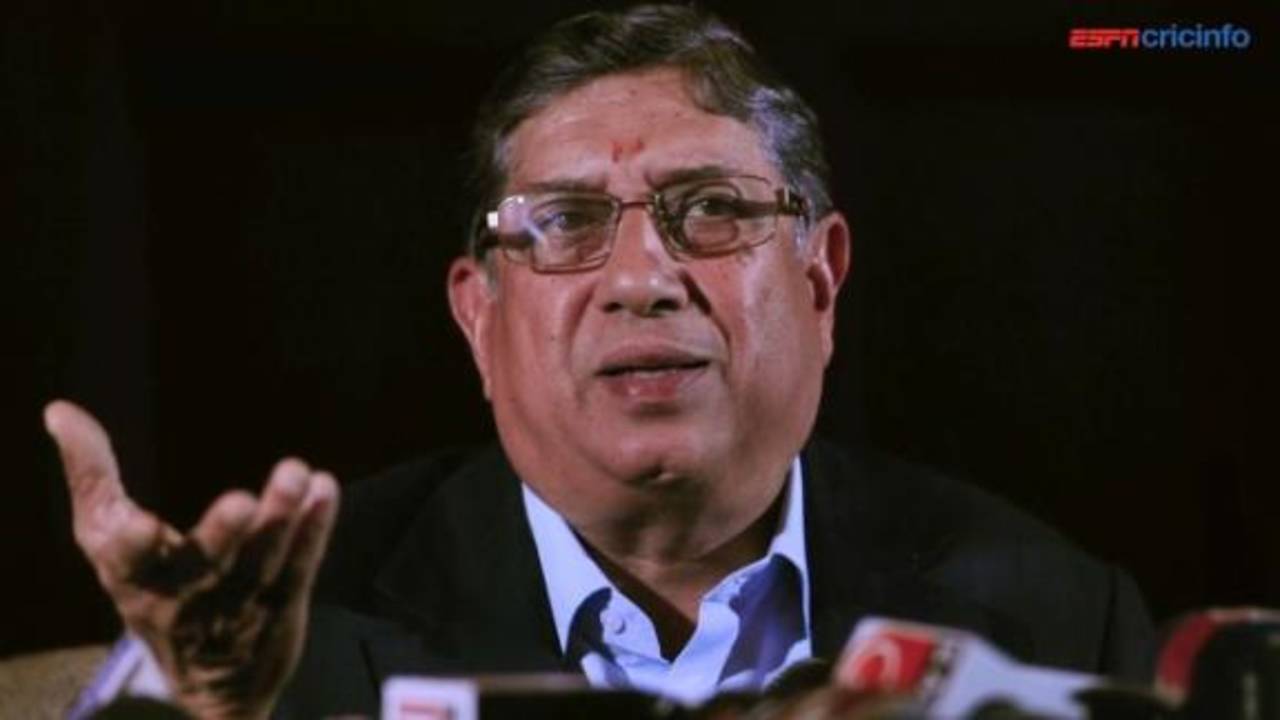The Supreme Court has added a dimension to the IPL spot-fixing case by bringing in the issue of N Srinivasan's alleged conflict of interest in being the head of the BCCI and the owner of the Chennai Super Kings franchise. The court made these observations today while hearing arguments from lawyers of the BCCI and Srinivasan, currently sidelined as the board president.
It also suggested that Srinivasan's return as BCCI president was not going to be a simple process. "You are assuming that the [Mudgal Committee] report has cleared you," the court of Justices TS Thakur and FM Kalifullah said. "You can't use BCCI rules to say that you will stand for elections, because the doctrine of public trust will apply." The fact that the BCCI was also bound by this doctrine of public was, the court said, due to position occupied by cricket in the country.
The issue of conflict of interest between Srinivasan's two roles had been taken to the Supreme Court, which in 2011 delivered a
split verdict on a petition challenging the right of Srinivasan - then the BCCI secretary - to hold a position in the board while also holding a stake in an IPL franchise.
On Monday, the court heard counsel for both sides, with Justice Thakur making frequent pointed observations about the need for the BCCI to be answerable to a larger public. The hearings - in a packed Court No 2, standing room only - took place as part of the arguments and objections of four non-playing officials, including Srinivasan, indicted in the final Mudgal Committee report presented to the Supreme Court earlier this month. The case will resume on Tuesday afternoon.
Responding to CA Sundaram's arguments on behalf of the BCCI stating that its working committee had "persons of standing" who could take a decision based on the findings of the report, Justice Thakur asked, "Should the BCCI use their administrative mechanisms in this matter? Several conflict of interest issues will arise and these questions can't be wished away."
He then went on to dissect Srinivasan's position in the matter, asking Sundaram one question after another with reference to the positions he holds in the BCCI and the IPL franchise. "Your duty as a president is to keep the show [IPL] running and to keep it clean. What is your duty as a team owner? To win the tournament. Is this not a conflict?"
Justice Kalifullah then stepped in and asked who had constituted the IPL committees and the BCCI president's role in their formulation. The BCCI counsel was asked, "You mean to say when a decision is taken in the BCCI, the president is a mute spectator in all this? That he has no say in the matter?
The court said, "You cannot make a distinction between the IPL and the BCCI. The IPL is a byproduct of BCCI," the court said, and described the IPL's original distribution of franchise ownerships as having been a "mutual benefit society."
Justice Thakur then pointed out to both lawyers that cricket was a religion in the country, with millions "who were passionate about the game without having any financial stake in it." It was this public trust, the judge said, that the BCCI needed to pay attention to. "Do you want to sit over the liquidation of the game in this country?" the BCCI was asked.
Srinivasan's lawyer Kapil Sibal argued about the recognition and importance given to Indian cricket in the global game to which Thakur said, "Recognition comes when one lakh [100,000] people turn up at Eden Gardens to watch a match. That recognition is not because of Srinivasan. The benefit of doubt must go to the game rather than the individual."
When Sibal said that Srinivasan had been "cleared" on counts of betting, fixing and stalling the investigation into corruption in the IPL, and he should be allowed to contest the upcoming BCCI elections, the court gave no assurance on the matter.
"Please don't go only by the report," Thakur said. "The report says you are not involved in betting or fixing or in stalling the investigation. But you have to ask whether, despite those findings, you are an owner of a team that is playing, an official of the team is found betting, you are related to that individual. Will that not affect your status as member of the BCCI?"
The Mudgal Committee counsel Raju Ramachandran brought the court's attention to the fact that both the reports filed by the committee - the first in
February and the second in
November - had to be read together, in terms of facts and findings, rather than using the November report findings in isolation with regard to the entire case.
The court said it expected that the indicted individuals would "challenge the report" and call it "useless." Thakur said, "We don't expect people to stand up and confess." But he said that there could be "corollaries and consequences" arising from the inferences contained in the report. "That you cannot escape."
These are oral observations made in the court and they do not constitute any orders as of now.
Sharda Ugra is senior editor at ESPNcricinfo
